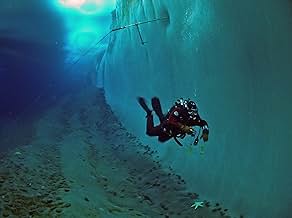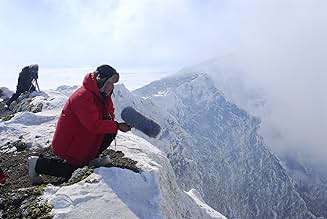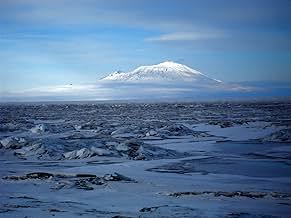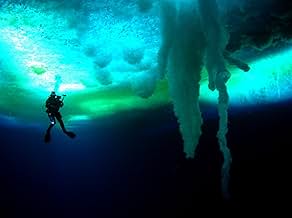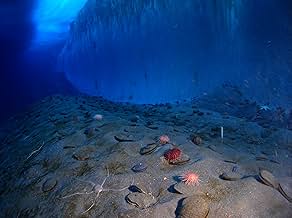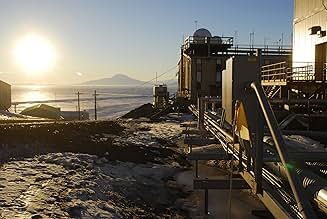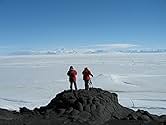CALIFICACIÓN DE IMDb
7.7/10
20 k
TU CALIFICACIÓN
Documental que retrata la vida cotidiana de los miembros de una comunidad científica en la Antártida.Documental que retrata la vida cotidiana de los miembros de una comunidad científica en la Antártida.Documental que retrata la vida cotidiana de los miembros de una comunidad científica en la Antártida.
- Dirección
- Guionista
- Elenco
- Nominado a 1 premio Óscar
- 2 premios ganados y 16 nominaciones en total
Doug MacAyeal
- Self - Glaciologist
- (as Douglas MacAyeal)
Ryan Andrew Evans
- Self - Filmmaker, Cook
- (as Ryan A. Evans)
- Dirección
- Guionista
- Todo el elenco y el equipo
- Producción, taquilla y más en IMDbPro
Opiniones destacadas
I am a big fan of Herr Zog. But while Encounters provided me with an overall positive experience, it is a flawed film. First, the good news. Hearing the inorganically musical underwater vocalizations of Weddell seals through the theater's multichannel speaker system was alone worth the price of admission. One of the scientists studying the pinnipeds aptly describes their varied and otherworldly sounds as Pink Floydian. I am also pleased to have beheld extended footage of the magnificent world beneath the sea ice. It is a teeming environment whose surface we are only beginning to scratch, and I cannot blame Herzog for choosing choral background music that perhaps screams "awe" a bit too loudly; there is no danger of it cheapening the majesty of the frozen stalactites or the splendor of the sunlight dispersing through the ice-ceiling. Lastly, I'll note the humor, usually intentional, that Herzog uncharacteristically displays. His Teutonic deadpan is not his only comedic asset; he has a keen sense of the ridiculous, and ample targets among the many dubious denizens of the Antarctic.
My complaints are essentially twofold. First, the movie is disjointed. It is a hodgepodge of Herzog's encounters with various Antarctic researchers and residents; there is no apparent order or theme. This is a minor criticism, as most of the segments make for fine viewing on their own, but it would have been more satisfying if Herzog had presented a unifying thesis or two about the Light Continent (aside from the oft-repeated observation that it is populated by a fair number of "professional dreamers"). He should have at least arranged the segments in a clearly meaningful sequence. At its best, the film made no more of an impression on me than "that was beautiful," "that was cool," or "I didn't know that." Second, and more significantly, Herzog's narration is at times irritating. As someone who has studied climate change, I share his frustration and pessimism. But there is no call for saddling the film's final moments with apocalyptic platitudes (e.g., "the end of human life is assured") and a cursory reference to global warming. These sentiments are incongruous with the rest of the film, which does not substantially address environmentalism and whose most haunting scene is of a mad penguin that abandons its flock and runs inland towards distant mountains, to certain death, with a singular determination. Herzog's doomsayings, in any event, are better communicated by the satellite images of rapidly melting polar ice that we observe on a climatologist's computer screen. I know that Herzog is capable of more measured reflections on the impersonal and uncontrollable power of nature; for example, from Grizzly Man: "what haunts me is that in all the faces of all the bears that Treadwell ever filmed, I discover no kinship, no understanding, no mercy. I see only the overwhelming indifference of nature. To me, there is no such thing as a secret world of the bears. And this blank stare speaks only of a half-bored interest in food. But for Timothy Treadwell, this bear was a friend, a savior." In Encounters, Herzog superficially and self-indulgently overstates his case. I'm looking forward to his next film.
My complaints are essentially twofold. First, the movie is disjointed. It is a hodgepodge of Herzog's encounters with various Antarctic researchers and residents; there is no apparent order or theme. This is a minor criticism, as most of the segments make for fine viewing on their own, but it would have been more satisfying if Herzog had presented a unifying thesis or two about the Light Continent (aside from the oft-repeated observation that it is populated by a fair number of "professional dreamers"). He should have at least arranged the segments in a clearly meaningful sequence. At its best, the film made no more of an impression on me than "that was beautiful," "that was cool," or "I didn't know that." Second, and more significantly, Herzog's narration is at times irritating. As someone who has studied climate change, I share his frustration and pessimism. But there is no call for saddling the film's final moments with apocalyptic platitudes (e.g., "the end of human life is assured") and a cursory reference to global warming. These sentiments are incongruous with the rest of the film, which does not substantially address environmentalism and whose most haunting scene is of a mad penguin that abandons its flock and runs inland towards distant mountains, to certain death, with a singular determination. Herzog's doomsayings, in any event, are better communicated by the satellite images of rapidly melting polar ice that we observe on a climatologist's computer screen. I know that Herzog is capable of more measured reflections on the impersonal and uncontrollable power of nature; for example, from Grizzly Man: "what haunts me is that in all the faces of all the bears that Treadwell ever filmed, I discover no kinship, no understanding, no mercy. I see only the overwhelming indifference of nature. To me, there is no such thing as a secret world of the bears. And this blank stare speaks only of a half-bored interest in food. But for Timothy Treadwell, this bear was a friend, a savior." In Encounters, Herzog superficially and self-indulgently overstates his case. I'm looking forward to his next film.
Encounters is an almost straight forward account of Werner Herzog going to Antarctica.Invited to go by one of the scientific organizations he agreed to go because he was fascinated by life under the sea ice (see his Wild Blue Yonder which used footage from under the ice to represent an alien world) and wanted to have a chance to film life there. He also warned them it would not result in film about fluffy penguins.
This is not Shackleton's Antarctica. The main US base is more like a mining colony anywhere on the fringes of civilization then what you think of when you think Antarctica. Its strangely modern and looks to be almost anywhere people mine. Indeed there is an odd shot of the modern camp with Scott's hut in the distance that signals how times have changed.
Herzog's film is really about some of the wayward travelers who have reached the frontier. Herzog is curious what sort of people they are and finds them to be a rather philosophical lot. They are what you would consider explorers of the 18th or 19th century looking for something greater then themselves. As one guy says "Where else do you find guys with Phds doing the dishes, or linguists on the one place on earth where there is no native language." Its an amusing portrait of people I think many of us would like to be.
We also get a portrait of what life is like there. Of the eternal sun (which annoys Herzog)Of the drabness of the living quarters (motel like)mixed with individual expression. We see the survival training, the various scientific studies going on (including one about penguins which cause Herzog to ponder if they go mad). and we see the landscape both above and below the ice on land and in the sea. These portraits of the land and seascapes are stunning. Herzog's ability to mix music and image creates some hypnotic passages that in part reminded me Koyaanisqatsi or Luc Besson's Atlantis. Its magical and creates sequences that you hate to see end.
If there is any flaw is that the film kind of just ends. There is a wonderful final quote by Alan Watts, but the film ultimately feels like a philosophical travelogue about a summer vacation instead of something grander then what I saw on my vacation. I'm sure had it not been Werner Herzog behind the camera I would not have been disappointed.
Still you must see the film on a big screen if you can. Its really beautiful at times. It will enlighten and inspire you- much more than this review will. And even though this is a Discovery Channel film, I'm glad I saw it where I did because there is something about the end credits with the seal songs echoing all thorough the theater from front to back that you can't get at home. The long confines of the Film Forum in New York really allows for the magic of a sound scape.
7.5 out of 10
This is not Shackleton's Antarctica. The main US base is more like a mining colony anywhere on the fringes of civilization then what you think of when you think Antarctica. Its strangely modern and looks to be almost anywhere people mine. Indeed there is an odd shot of the modern camp with Scott's hut in the distance that signals how times have changed.
Herzog's film is really about some of the wayward travelers who have reached the frontier. Herzog is curious what sort of people they are and finds them to be a rather philosophical lot. They are what you would consider explorers of the 18th or 19th century looking for something greater then themselves. As one guy says "Where else do you find guys with Phds doing the dishes, or linguists on the one place on earth where there is no native language." Its an amusing portrait of people I think many of us would like to be.
We also get a portrait of what life is like there. Of the eternal sun (which annoys Herzog)Of the drabness of the living quarters (motel like)mixed with individual expression. We see the survival training, the various scientific studies going on (including one about penguins which cause Herzog to ponder if they go mad). and we see the landscape both above and below the ice on land and in the sea. These portraits of the land and seascapes are stunning. Herzog's ability to mix music and image creates some hypnotic passages that in part reminded me Koyaanisqatsi or Luc Besson's Atlantis. Its magical and creates sequences that you hate to see end.
If there is any flaw is that the film kind of just ends. There is a wonderful final quote by Alan Watts, but the film ultimately feels like a philosophical travelogue about a summer vacation instead of something grander then what I saw on my vacation. I'm sure had it not been Werner Herzog behind the camera I would not have been disappointed.
Still you must see the film on a big screen if you can. Its really beautiful at times. It will enlighten and inspire you- much more than this review will. And even though this is a Discovery Channel film, I'm glad I saw it where I did because there is something about the end credits with the seal songs echoing all thorough the theater from front to back that you can't get at home. The long confines of the Film Forum in New York really allows for the magic of a sound scape.
7.5 out of 10
This is an odd documentary. On one hand, I found much of the film to be rather confusing and pointless, the overall effect is still very engaging--mostly because you see things in this film you'll never see anywhere else! The famed German director Werner Herzog travels to Antarctica with a film crew. Considering Herzog's reputation, traveling there isn't much of a surprise. After all, he's the same crazed guy who took crews into the most inhospitable portions of South America to film "Fitzcarraldo" and "Aguirre: The Wrath of God". What follows is quite strange, as he goes to the most fascinating and terrific places--but also fills the movie with tons of interviews which are bizarre. Often, these folks living at the various research projects there wax very lyrical--and the film is quite philosophical but also just plain strange. It sounded, at times, like the folks living around McMurdo Station had lost their mind or were well on their way! Often, these folks talk and talk...yet appear to be saying nothing.
But, the film STILL is mesmerizing. You learn about the very unearthly sort of sounds the seals make under the ice, the sad story of a mixed-up penguin, some amazing volcano research and lots of odd facts about this MOSTLY desolate continent. Well worth seeing--just don't be too turned off by the occasionally bizarre dialog.
But, the film STILL is mesmerizing. You learn about the very unearthly sort of sounds the seals make under the ice, the sad story of a mixed-up penguin, some amazing volcano research and lots of odd facts about this MOSTLY desolate continent. Well worth seeing--just don't be too turned off by the occasionally bizarre dialog.
'Encounters at the End of the World' is an engrossing, fascinating exploration of what it takes to exist in one of the world's most unforgiving landscapes.
Almost a companion piece to Herzog's earlier poem-like Fata Morgana, the film brings us into a world hidden to almost all but a very chosen few.
There are incredible exchanges between Herzog and his human subjects, who are all researchers studying various aspects of the Antarctic eco-sphere. One such exchange with a cell biologist involves the idea that humans evolved from the ocean to escape what the scientist terms the 'absolute horror' of existence among the extremely vicious, often microscopic 'monsters' that savagely fight for their existence in the frozen waters. Some of these creatures are shown in remarkable underwater photography and it's not hard to see what he means.
Another interview that I found both terrifying and fascinating was one with a journeyman plumber (who also is allegedly related to the Ancient Aztec royalty) about the effects of global warming. I didn't like 'An Inconvenient Truth' and have always been somewhat on the fence about global warming. But the way this man describes global warming set the hairs on my arms on end. The subject is returned to later in the film with several scientists advocating an even bleaker outlook on the topic. Their consensus is that we have already tipped the point of no return and that our existence as humans is already marked for extinction.
As one glacierologist, pointing at a radar screen showing formations of large glaciers puts it: "I don't want to know what happens when that melts." By the way, did you know that seal calls are like the sound of Moog synths and earlier Pink Floyd? I haven't even scratched the surface of this film. There are so many breathtaking moments of sheer rugged beauty that it will bring tears to your eyes.
Do not see this movie on video or DVD. Unlike 'Grizzly Man' which was more of a television format film, "Encounters At the End of The World" is deeply, deeply cinematic.
How many Bat-films do you need to see anyway? Do your brain a favor and lose yourself in 'Encounters at the End of The World'.
Best film of '08 hands down.
Almost a companion piece to Herzog's earlier poem-like Fata Morgana, the film brings us into a world hidden to almost all but a very chosen few.
There are incredible exchanges between Herzog and his human subjects, who are all researchers studying various aspects of the Antarctic eco-sphere. One such exchange with a cell biologist involves the idea that humans evolved from the ocean to escape what the scientist terms the 'absolute horror' of existence among the extremely vicious, often microscopic 'monsters' that savagely fight for their existence in the frozen waters. Some of these creatures are shown in remarkable underwater photography and it's not hard to see what he means.
Another interview that I found both terrifying and fascinating was one with a journeyman plumber (who also is allegedly related to the Ancient Aztec royalty) about the effects of global warming. I didn't like 'An Inconvenient Truth' and have always been somewhat on the fence about global warming. But the way this man describes global warming set the hairs on my arms on end. The subject is returned to later in the film with several scientists advocating an even bleaker outlook on the topic. Their consensus is that we have already tipped the point of no return and that our existence as humans is already marked for extinction.
As one glacierologist, pointing at a radar screen showing formations of large glaciers puts it: "I don't want to know what happens when that melts." By the way, did you know that seal calls are like the sound of Moog synths and earlier Pink Floyd? I haven't even scratched the surface of this film. There are so many breathtaking moments of sheer rugged beauty that it will bring tears to your eyes.
Do not see this movie on video or DVD. Unlike 'Grizzly Man' which was more of a television format film, "Encounters At the End of The World" is deeply, deeply cinematic.
How many Bat-films do you need to see anyway? Do your brain a favor and lose yourself in 'Encounters at the End of The World'.
Best film of '08 hands down.
10xlr884
I had a chance to see Werner Herzog's latest documentary at the Telluride Film Festival, where it received great buzz and very high praise upon its debut. Herzog informed the audience that he was shown some footage taken by a photographer in Antarctica while doing post-production on Grizzly Man and he was immediately entranced by what he saw. From this he was compelled to visit the continent and shoot some footage of his own, which became Encounters at the End of the World.
The film perfectly balances both gorgeous footage of the continent as well as fascinating interviews and anecdotes of the many researchers and workers of the McMurdo research station. There are many humorous moments, such as a scene in which visitors must go through a follow-the-leader type exercise before being allowed to venture out into the wild. Participants in the exercise must wear buckets adorned with ridiculous caricatures over their heads in order to simulate a whiteout. They must then try to follow each other as a group and find a researcher a distance away. Herzog simply observes as the participants fail over and over to find the researcher, which left the audience laughing for minutes on end. Another excellent scene has Herzog interviewing an expert on penguins, who goes into some of their more bizarre behavior, such when penguins go insane. In both cases, Herzog features striking footage and amusing interviews and narration.
The film fits in well with Herzog's already substantial canon. It is a beautiful look at a beautiful continent populated by a forklift driver with a PhD, a woman who once traveled to South America in a sewage pipe on the back of a truck, researchers who play electric guitars on top of research station to celebrate discovering three new species of aquatic life in one day, and many more. Their stories converge where all the lines on the map meet at the end of the world. Herzog shot the film with a crew of just himself and the camera operator, and the result is a film with some of the most beautiful footage I've ever seen. Do not miss this when it receives general release!
The film perfectly balances both gorgeous footage of the continent as well as fascinating interviews and anecdotes of the many researchers and workers of the McMurdo research station. There are many humorous moments, such as a scene in which visitors must go through a follow-the-leader type exercise before being allowed to venture out into the wild. Participants in the exercise must wear buckets adorned with ridiculous caricatures over their heads in order to simulate a whiteout. They must then try to follow each other as a group and find a researcher a distance away. Herzog simply observes as the participants fail over and over to find the researcher, which left the audience laughing for minutes on end. Another excellent scene has Herzog interviewing an expert on penguins, who goes into some of their more bizarre behavior, such when penguins go insane. In both cases, Herzog features striking footage and amusing interviews and narration.
The film fits in well with Herzog's already substantial canon. It is a beautiful look at a beautiful continent populated by a forklift driver with a PhD, a woman who once traveled to South America in a sewage pipe on the back of a truck, researchers who play electric guitars on top of research station to celebrate discovering three new species of aquatic life in one day, and many more. Their stories converge where all the lines on the map meet at the end of the world. Herzog shot the film with a crew of just himself and the camera operator, and the result is a film with some of the most beautiful footage I've ever seen. Do not miss this when it receives general release!
¿Sabías que…?
- TriviaWerner Herzog dedicated the film to Roger Ebert, who he calls a true "warrior of cinema". Due to the dedication Ebert could not review the film, but he wrote a complimentary letter to Herzog and later published it.
- Citas
[last lines]
Stefan Pashov: There is a beautiful saying by an American philosopher, Alan Watts. He used to say that through our eyes the universe is perceiving itself, and through our ears the universe is listening to its cosmic harmonies. And we are the witness to which the universe becomes conscious of its glory, of its magnificence.
- ConexionesEdited from El mundo en peligro (1954)
- Bandas sonorasPlanino Stara Planino Mari
Written by Stefan Dragostinov
Performed by The Philip Koutev National Folk Ensemble
Selecciones populares
Inicia sesión para calificar y agrega a la lista de videos para obtener recomendaciones personalizadas
- How long is Encounters at the End of the World?Con tecnología de Alexa
Detalles
- Fecha de lanzamiento
- País de origen
- Sitio oficial
- Idiomas
- También se conoce como
- Encounters at the End of the World
- Locaciones de filmación
- Productoras
- Ver más créditos de la compañía en IMDbPro
Taquilla
- Total en EE. UU. y Canadá
- USD 944,933
- Fin de semana de estreno en EE. UU. y Canadá
- USD 17,730
- 15 jun 2008
- Total a nivel mundial
- USD 1,205,464
- Tiempo de ejecución
- 1h 39min(99 min)
- Color
- Mezcla de sonido
- Relación de aspecto
- 1.78 : 1
Contribuir a esta página
Sugiere una edición o agrega el contenido que falta







